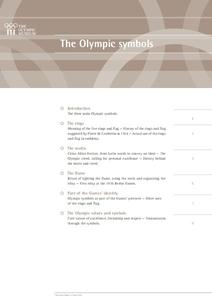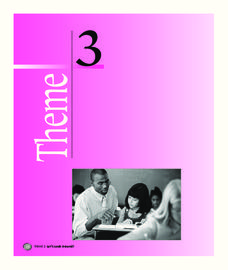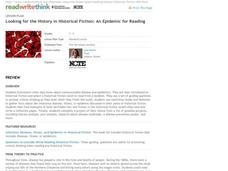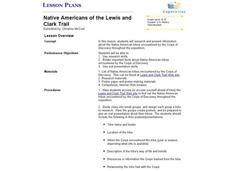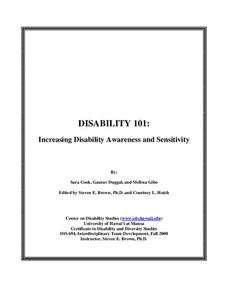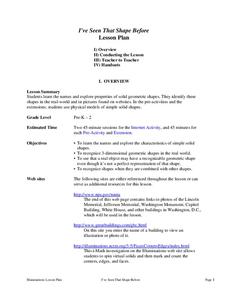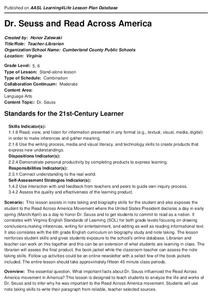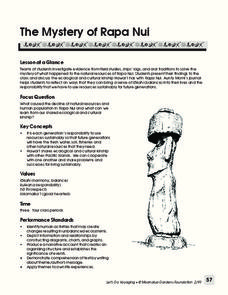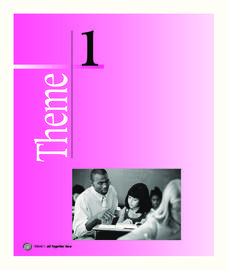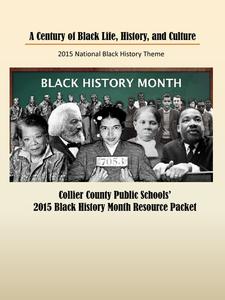Olympic Museum
The Olympic Symbols
Get into the Olympic spirit with a resource about the values and symbols of the Olympic Games. With sections about prominent images of the Olympics, including the flame and the interlocked rings, the packet supplies engaging information...
University of Georgia
Land Biomes Project
Challenge scholars to research a biome and create a presentation for the producers of Survivor to choose their ecosystem for the next season's show. The materials include outlines, worksheets, and grading rubrics for individuals as well...
NASA
Space-Based Astronomy on the Internet
Young scientists compile everything they have learned into a report in the fifth and final lesson in a unit on the visible light spectrum. Access to photos from observatories, telescopes, and satellites allows learners to compare and...
Houghton Mifflin Harcourt
Let’s Look Around!: Challenge Activities (Theme 3)
Let's Look Around! is the theme of a unit that offers a plethora of challenge activities. Enhance your scholars' learning experiences and reinforce concepts with activities such as writing a book about farm animals, an imaginary place,...
EngageNY
Planning Ideas: Developing a Colonial Character Profile
The second lesson in a historical fiction series encourages pupils to develop a character profile of a colonial person using research acquired in the previous unit. Learners prepare their historical fiction narrative by responding to a...
WindWise Education
What is Wind Power's Risk to Birds?
How is risk determined? Through the use of a reading passage, individuals or groups learn about bird interactions with man made structures along with wind turbines. Pupils use information from the second reading passage to conduct an...
Curated OER
Genome: The Secret of How Life Works
What do you have in common with a fruit fly? About 60 percent of your DNA. The resource, divided into two units, is intended for grades four to eight and another for high schoolers. Both units include eight lessons covering the genome as...
ReadWriteThink
Looking for the History in Historical Fiction: An Epidemic for Reading
Combine informational reading skills with fictional text in an innovative historical fiction lessons. After reading a fictional text related to diseases, class members read non-fictional text to gain knowledge about specific infectious...
Teach Engineering
Energy Systems
Is electricity created in the outlet? Using posters of several energy systems, collaborative groups identify and describe the parts of their systems. The groups also look at the environmental impacts of the systems and present their...
Edgate
Native Americans of the Lewis and Clark Trail
As part of a study of the Corps of Discovery expedition, class groups research the different Native American tribes Lewis and Clark encountered on their journey and share their findings with the class.
Curated OER
Increasing Disability Awareness and Sensitivity
Designed to promote disability awareness and sensitivity, the five lessons and activities in this packet provide class members with information about disabilities, and with models of behaviors and language that help to break down...
New York City Department of Education
Geography and Early Peoples of the Western Hemisphere
Young historians discover the early people of the western hemisphere. The unit explores how the land changed, how it was used and homes of early Americans such as Incas, Mayans, Inuits, Aztecs, and Pueblos. Individuals also examine these...
New York City Department of Education
Colonial America and The American Revolution
How did the founding of the American colonies lead to a revolution? Use the essential question and sample activities to guide learners through a series of history lessons. Additionally, the packet includes effective strategies to...
Houghton Mifflin Harcourt
Surprise!: Challenge Activities (Theme 2)
Surprise! is the theme of this series of challenge activities. The surprise comes from the information your scholars will discover when researching topics such as alligators and crocodiles, living in other countries, becoming a...
Earth Day Network
Filtering Water
See the water filtration system up close with a fun science experiment. Young scientists work for several class periods to design a water filter using household objects, and then decide which filter material would be most effective in...
Fayetteville Public Schools
I've Seen That Shape Before
The objectives in the resource allow students to explore the characteristics of simple solid shapes. Youngsters learn to recognize the face shapes, corners, and edges that make up 3-D figures by filling in a chart. Lastly, learners look...
Middle Tennessee State University
The Invention of the Telephone
All of the people in your class would agree that life would be different without the invention of the telephone! Study Alexander Graham Bell's most famous and influential invention through the primary source document of his sketch of the...
Curated OER
Dr. Seuss and Read Across America
What important facts about Dr. Seuss influenced the Read Across America movement...? This is the driving question of a research project that requires scholars to find information about Dr. Seuss' life and work. Class members write a...
Indiana University Libraries
Web Page Evaluation
Invite your learners to research three different websites that pertain to a topic focused on in your syllabus. Students fill out a chart by answering questions about each site. Then, they compare how useful the sites are to one another....
Teacher's Corner
Dr. Seuss Author Study
Want to know more about Dr. Seuss? Scholars research topics such as his childhood, family, education, jobs, and story themes to learn more about the ever-popular and fun to read author, Dr. Seuss.
George Washington's Mount Vernon Estate & Gardens
George Washington: Centerpiece of a Nation
A neat Presidents Day activity, this lesson provides a culminating learning experience for upper elementary aged learners. After analyzing George Washington's, "A Display of the United States of America," your learners will conduct...
Moanalua Gardens Foundation
The Mystery of Rapa Nui
What caused the collapse of the environment on Rapa Nui (Easter Island)? Who constructed the Moai? What was their purpose? Class members assume the role of investigators and use evidence drawn from field studies, ships' logs, and...
Houghton Mifflin Harcourt
All Together Now: Challenge Activities (Theme 1)
For scholars who need a challenge in the classroom, here is a unit for you. Learners explore topics such as animals, sports, helpers at home, the past, and funny things that have happened in their lives. Youngsters also engage in writing...
Florida Association of Social Studies Supervisors
A Century of Black Life, History, and Culture
Packed with a wealth of information about African-Americans of note, this packet, and the links it provides to other resources, could be used as is for a month-long study of Black history or to supplement lessons already in your curriculum.


